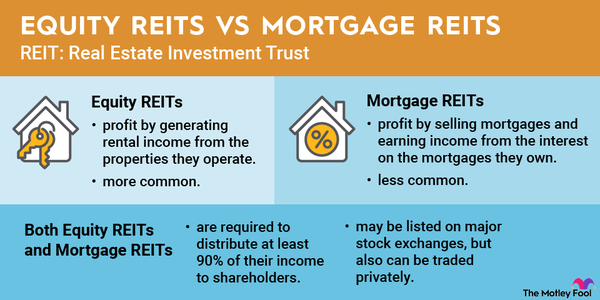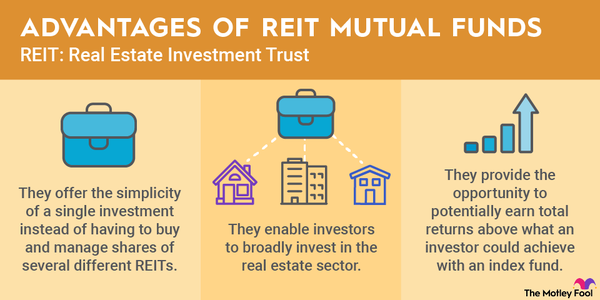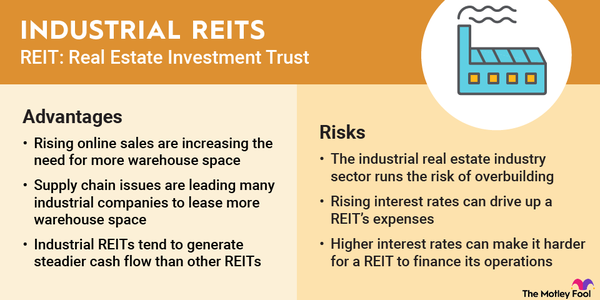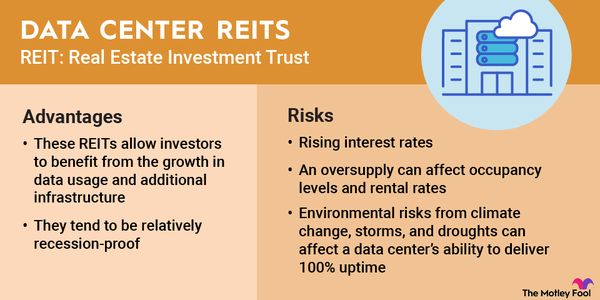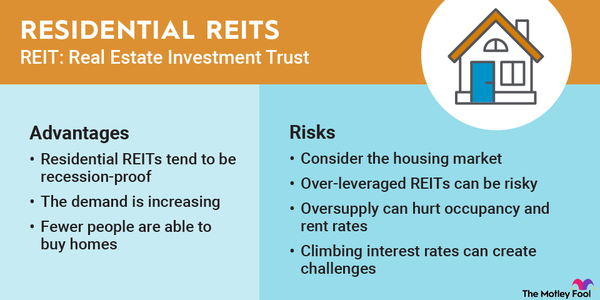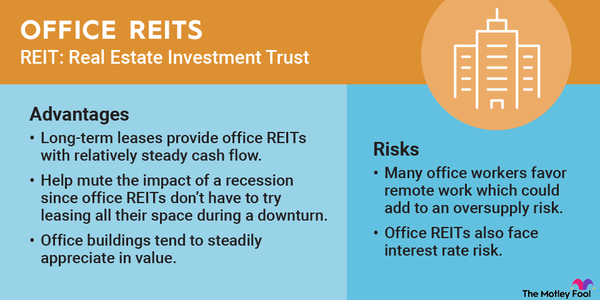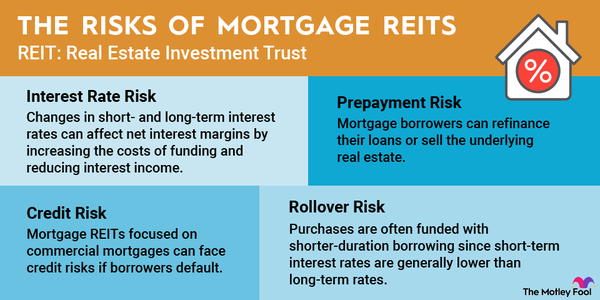Self-storage real estate investment trusts (REITs) are companies that own, operate, and manage mini-warehouse storage facilities. These properties enable businesses and individuals to securely store items in individual storage units.
Here's a closer look at the self-storage REIT business. We will explore its advantages and risks, and some leading self-storage REITs that investors should consider.

Understanding self-storage REITs
Understanding self-storage REITs
Self-storage properties are small warehouses with multiple units that range in size. Owners lease storage units in these buildings to businesses and individuals who need space to store inventory or household items. Some self-storage operators will also rent parking spaces to store boats, RVs, and other vehicles.
Most self-storage units rent on a month-to-month basis. That differs from the lease structure of many other REITs, which typically own properties that lease space for a year or more. On the one hand, the shorter-term lease structure enables self-storage REITs to raise rents more frequently to market rates. On the other hand, they might have to reduce rents during a down market.
In addition to generating rental income, self-storage REITs have several other potential revenue sources, depending on their business model. These can include tenant reinsurance income, late fees, management fees, and the sale of moving materials (boxes, packaging, tape, etc.).
Advantages
Advantages of investing in self-storage REITs
Self-storage REITs provide investors with several benefits, including:
- Steadily rising demand: Storage space demand drivers include relocation, decluttering, disasters, changing life circumstances, and business purposes. These factors tend to keep occupancy levels high while steadily pushing rental rates higher.
- Low break-even levels: Self-storage properties are one of the lowest-cost real estate investments since they're typically inexpensive to build and operate. As a result, they tend to have relatively low occupancy break-even rates. These factors enable self-storage investments to generate high margins and investment returns.
- Strong historical returns: Self-storage REITs have historically been among the best-performing investments in the REIT sector. They have significantly outperformed other real estate investments over the past decade, including leading REIT ETF Vanguard Real Estate ETF (VNQ -0.61%).

Risks
Risks of investing in self-storage REITs
While self-storage REITs have been excellent long-term investments, they're not without risk. There are two notable sector-specific risks:
- Oversupply risk: Because self-storage facilities are cheap to build and operate, there are low barriers to entry. Developers can quickly build new capacity, which can increase competition for customers in a market, weighing on occupancy levels and rental rates at existing facilities.
- Economic risk: Due to the short-term nature of self-storage leases, the sector has more exposure to an economic downturn. If the economy takes a hit, fewer people will move. Businesses might also cut back expenses, impacting occupancy and rental rates.
In addition to those sector-specific risks, self-storage REITs face two intertwined potential headwinds common to the entire REIT sector: interest rate risk and financing risk.
As interest rates rise, borrowing money becomes more expensive. If a REIT has lots of floating-rate debt or near-term maturities, rising rates can increase its interest expenses. Higher interest rates can also affect a REIT's ability to finance acquisitions and development projects.
Meanwhile, rising interest rates tend to weigh on REIT stock prices. That's because it makes lower-risk alternatives such as bonds more attractive investments since their income yields rise. As a result, REIT stock prices tend to fall, pushing up their dividend yields to compensate investors for their higher risk levels.
Best self-storage REITs
The best self-storage REITs to buy right now
There were four large publicly traded self-storage REITs entering 2025. While all focus on owning, operating, and managing self-storage facilities, three of them stand out for their slightly differentiated business models.
| Name and ticker | Market cap | Dividend yield | Industry |
|---|---|---|---|
| Public Storage (NYSE:PSA) | $50 billion | 4.24% | Specialized REITs |
| Extra Space Storage (NYSE:EXR) | $29 billion | 4.73% | Specialized REITs |
| National Storage Affiliates Trust (NYSE:NSA) | $2 billion | 7.48% | Specialized REITs |
Here's a closer look at what makes these self-storage REITs different from their competitors.
1. Public Storage
Public Storage is the largest self-storage REIT by market cap. In mid-2025, it had more than 3,400 owned or operated properties and more than 250 million square feet of net rentable space across 40 states. In addition, it also owns a 35% interest in European self-storage REIT Shurgard Self Storage, which owns 321 self-storage properties in seven Western European countries with 18 million net rentable square feet.
Its property development platform differentiates Public Storage from its self-storage REIT peers. It's the only REIT that develops new properties; the rest primarily expand by acquisition. The company's development strategy has enabled Public Storage to earn higher investment returns compared to acquisitions over the years.
Public Storage will also invest in redevelopment projects and make acquisitions. The company was working on its latest deal in mid-2025, partnering with Ki-Corporation to bid on acquiring Australia's Abacus Storage King.
2. Extra Space Storage
Extra Space Storage is the largest player in the U.S. self-storage sector after buying rival Life Storage in a $15 billion deal in 2023. In mid-2025, it had almost 4,180 properties in 43 states, with more than 321.5 million square feet of rentable space. It controlled 15% of the U.S. self-storage market, which was the largest share in the sector (bigger than Public Storage's 10.6% share).
Extra Space Storage's third-party management platform sets it apart from other self-storage REITs. While most REIT rivals also manage properties owned by third parties, Extra Space Storage was an early leader in this business model. It currently manages more properties than any of its competitors (1,675 in mid-2025, compared to 820 for CubeSmart (CUBE -1.13%) and 314 for Public Storage).
This strategy has several benefits. It generates steady management fee income and requires little up-front investment. Meanwhile, it provides the company with a steady stream of acquisition opportunities. Extra Space Storage can purchase a property it knows very well when the owner sells, reducing risk.
3. National Storage Affiliates
National Storage Affiliates entered 2025 with more than 1,067 self-storage properties across 37 states and Puerto Rico, with about 69.7 million rentable square feet. It focuses on owning properties across the country's top 100 metro areas.
What's unique about National Storage Affiliates is that it doesn't consolidate its properties under one national brand. Instead, it owns, operates, and manages strong regional brands.
The company was undergoing an internal consolidation strategy to transition from a dozen brands to seven market-focused brands. This strategy will strengthen its core brands and reduce costs, which should enhance its returns. It can then leverage those stronger brands to expand in their markets by acquiring smaller rivals and transitioning them to the more-focused regional brand.
Related investing topics
Bottom line
Self-storage REITs have historically been great investments
Self-storage REITs benefit from a combination of lower costs, high demand, and short-term lease structures, which have enabled the sector to steadily increase income. That has helped the industry generate above-average total returns over the years. The ability to earn high returns makes self-storage REITs attractive options that real estate investors should closely consider.
FAQ
FAQ on self-storage REITs.
What is the cap rate for self-storage REITs?
The cap rate for self-storage REITs is around 5.5%.
Is National Storage REIT a good investment?
National Storage REIT could be a good investment. Australia's largest self-storage operator is a pioneer in the sector and a consolidator in the industry. Its steady expansion should enable the company to grow shareholder value.
Who is the biggest self-storage company?
Extra Space Storage is the largest self-storage company in the U.S. with a 15% share of the market by square footage.
Is self-storage REIT still a good investment?
Self-storage REITs are still good investments. They have historically delivered above-average total returns, driven by their low costs and rising demand for space. Those two catalysts position the sector to continue growing shareholder value in the future.
Is the self-storage market saturated?
The U.S. self-storage market has been getting more saturated in recent years. Occupancy and rental rates peaked in 2022 and have been declining since that time due to a surge in new self-storage supply following the COVID-19 pandemic. On a more positive note, the rate of new supply is declining, while the population continues to demand more space. As a result, the market is absorbing this excess storage space.











